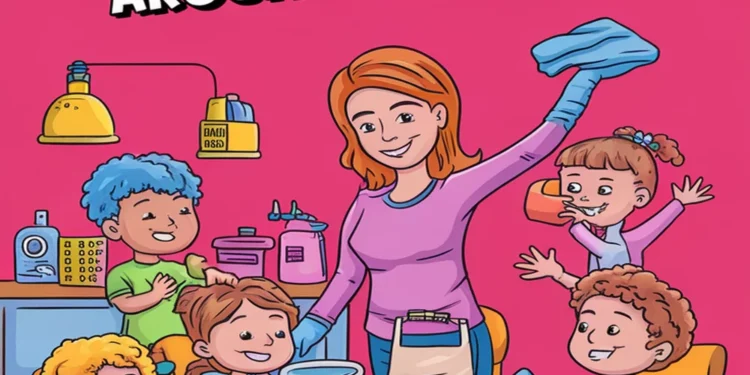To teach kids responsibility around the house, start by giving them age-appropriate chores, like letting your little one put away toys. Model positive behavior while involving them in tasks. Establish a consistent routine and use a chore chart to track progress, making chores feel like shared responsibilities. Celebrate their achievements with praise or small rewards. With clear expectations and encouragement, you’ll see their confidence grow. Stick around to uncover more tips that’ll help foster responsibility in your kids.
Make Chores Age-Appropriate
When you consider your child’s age and abilities, assigning chores becomes an opportunity for growth and learning. Start with simple tasks for younger kids, like putting away toys or wiping surfaces. At around five to six years old, they can help with tasks like sorting laundry or setting the table. As they grow, gradually increase the complexity of their responsibilities. For instance, by age eight, they can manage basic meal prep or take care of pets. Tailoring chores to their developmental stage not only teaches responsibility but also builds confidence. Remember to encourage them and celebrate their efforts, making chores a rewarding experience. This way, you foster a sense of accomplishment that will carry over into other aspects of their lives.
Lead by Example
Leading by example is one of the most powerful ways to instill a sense of responsibility in your kids. When they see you taking care of household tasks—whether it’s tidying up, doing laundry, or cooking—they’re more likely to mirror those behaviors. Share your thought process as you tackle chores, explaining why each task matters. Involve them in these activities by inviting them to join you, creating a collaborative atmosphere. Be open about your feelings when you’re facing challenges, showing them that responsibility can sometimes be tough but rewarding. Your actions and attitudes speak volumes; when they see you owning up to tasks and maintaining a positive outlook, they’ll feel encouraged to adopt similar habits themselves.
Recommended Items
Explore our curated selection of family-friendly products and tools to help instill responsibility in your kids!
Products
Establish a Routine
Establishing a routine not only provides structure but also helps kids understand the importance of responsibility in their daily lives. By incorporating daily tasks like making the bed or putting away toys, you’re teaching them to proactively contribute to their home. Set specific times for chores, like right after breakfast or before bedtime, so kids know what to expect. Consistency is key; the more they practice, the more likely these tasks become second nature. You might also consider involving them in creating the routine, ensuring they feel a sense of ownership. Remember, it’s okay if they stumble at first—patience and encouragement go a long way in helping them develop these essential skills.
Step-by-Step Guide to Teach Kids Responsibility
Use a Chore Chart
Using a chore chart not only simplifies task management but also empowers your kids by visually tracking their responsibilities. By involving them in the creation of the chart, you can boost their sense of ownership. It’s a practical way to remind them what needs to be done without nagging.
Here’s a simple example to get you started:
| Task | Completed |
|---|---|
| Make the bed | [ ] |
| Wash dishes | [ ] |
| Take out trash | [ ] |
Encourage your kids to check off tasks as they finish. This not only helps them develop consistency but also instills pride in their accomplishments. A chore chart can make household duties feel less like a burden and more of a shared responsibility.
Offer Choices and Options
While a chore chart helps kids understand their responsibilities, offering them choices in how they complete tasks can enhance their sense of autonomy. When you provide options, kids feel more invested and are likely to take ownership of their work. Here are some practical ways to offer choices:
- Let them pick between two chores: “Would you rather vacuum or dust today?”
- Offer different times for completing a task: “Would you like to do your laundry now or after dinner?”
- Allow them to choose their cleaning supplies: “Which bathroom cleaner do you want to use?”
- Give them options for rewards: “Would you prefer a weekend movie night or an extra hour of screen time?”
Empowering them this way can boost their motivation and responsibility.
Encourage Teamwork
Teamwork fosters a sense of community and shared responsibility in kids, making chores feel less like a burden. Encourage your children to collaborate on tasks, such as cleaning a room or preparing meals. By working together, they can share skills and support each other, helping to ease frustration. You might assign specific roles or let them divide tasks based on their interests. Celebrate their efforts as a team, reinforcing the idea that cooperation leads to success. Create a family chore chart that highlights everyone’s contributions, fostering accountability and unity. When kids see the collective results, they’ll take pride in their teamwork, strengthening their skills while lightening the workload for everyone. It’s about learning together and growing together!
Celebrate Achievements
After fostering teamwork, it’s important to recognize and celebrate your kids’ achievements, no matter how small. Celebrating success boosts their confidence and motivates them to contribute more. Here are four ways to do this effectively:
- Verbal Praise: Acknowledge their hard work with specific compliments to show you notice their efforts.
- Fun Rewards: Consider simple rewards like a family movie night or a favorite treat when they complete tasks.
- Celebrate Together: Take a moment as a family to highlight their achievements during dinner or a gathering.
- Create a ‘Success Board’: Post their accomplishments visibly at home, allowing them to see their progress over time.
Set Clear Expectations
To help kids develop a sense of responsibility, it is crucial to set clear expectations about what you want them to accomplish. Start by outlining specific tasks, like tidying their room or helping with dishes, and discuss why these responsibilities matter. Use simple language they can understand, and don’t hesitate to explain the importance of each task.
It’s also helpful to establish routines, so they know when to complete these tasks. Make sure to be patient—kids may need reminders initially. Check in regularly to see if they have questions or need support. By being direct and consistent, you create an environment where they feel empowered to take ownership of their responsibilities, ultimately fostering their growth and independence.
Provide Positive Reinforcement
Offering positive reinforcement is a powerful way to encourage kids as they take on responsibilities. When you acknowledge their efforts, it boosts their confidence and motivates them to do more. Here are some effective ways to provide that reinforcement:
- Verbal Praise: A simple “great job!” or “I’m proud of you!” can mean the world to them.
- Rewards: Consider small treats or privileges for completing tasks consistently.
- Quality Time: Spend some special moments celebrating their achievements, making them feel valued.
- Celebrate Milestones: Acknowledge their progress over time, whether through a family dinner or a fun outing.
Teach Problem-Solving Skills
As kids encounter challenges, teaching them problem-solving skills equips them to navigate obstacles effectively. Start by presenting a problem and guiding them through identifying potential solutions. This practice fosters independence and resilience.
Here’s a simple table to illustrate the process:
| Step | Action |
|---|---|
| Identify the Issue | What’s the problem we’re facing? |
| Brainstorm Solutions | List possible ways to solve it. |
| Evaluate Options | Which solution might work best? |
| Take Action | Implement the chosen solution. |
Encourage kids to think critically and make decisions. Celebrate their successes and discuss any setbacks, focusing on learning rather than blame. By nurturing these skills, you’re preparing them for life’s inevitable challenges.













